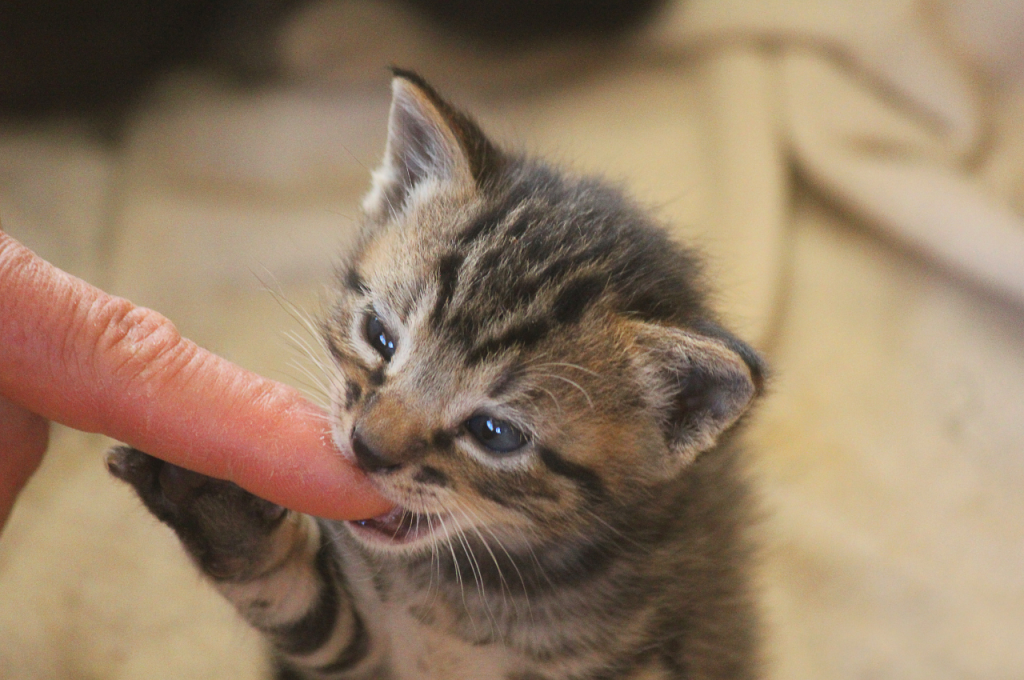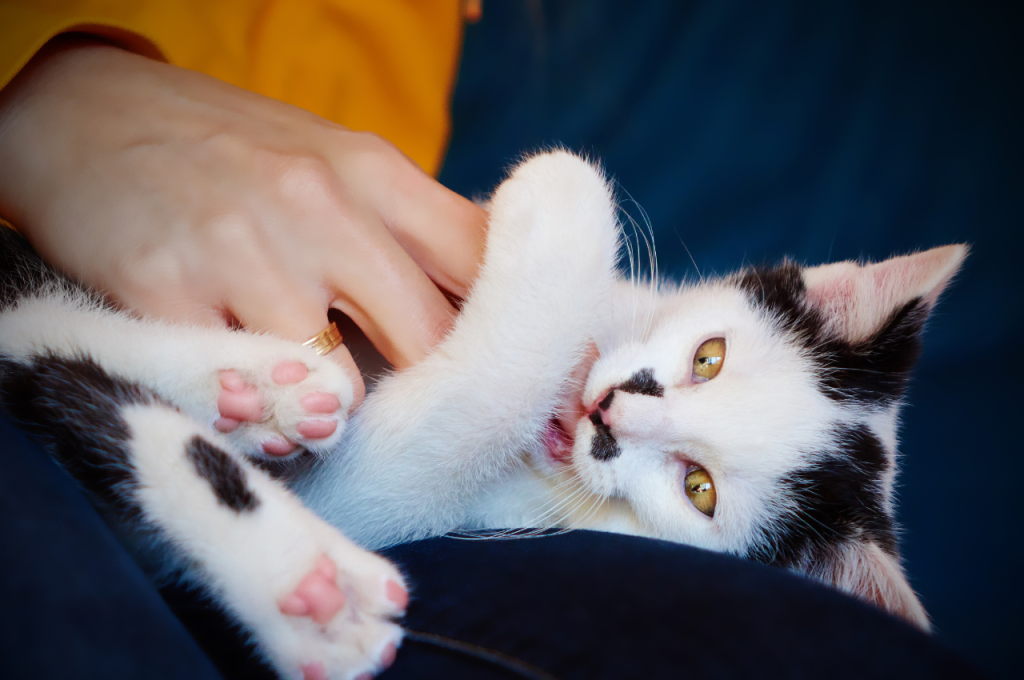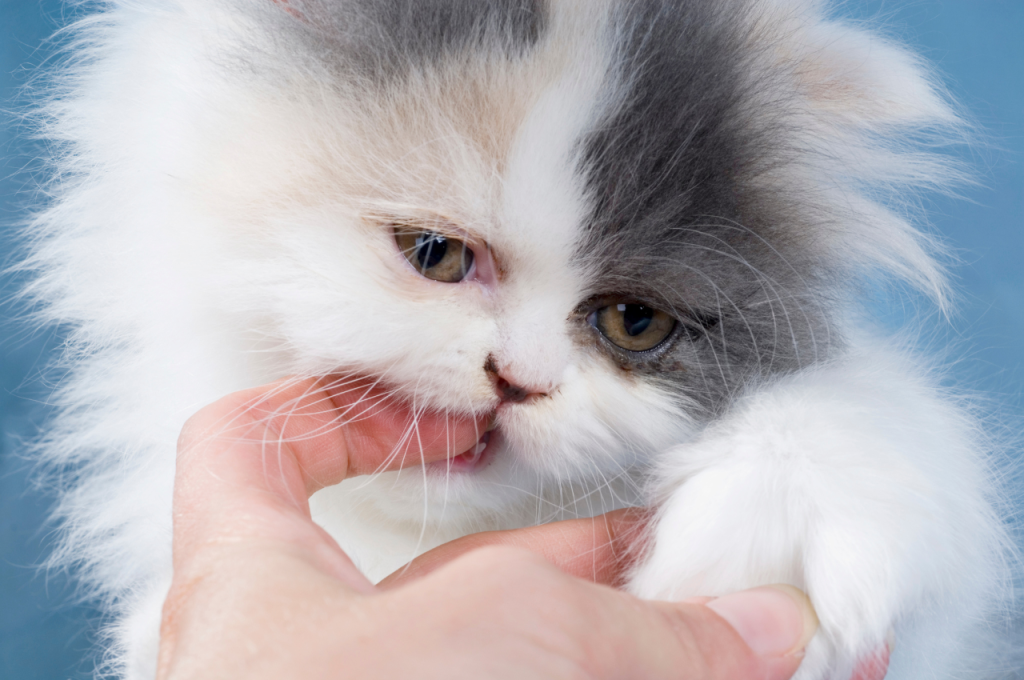To punish a biting kitten, redirect their attention to a toy or scratching post. Introduce positive reinforcement through treats and praise to discourage biting behavior.
Introducing a new kitten to your home can be an exciting and joyful experience. However, sometimes kittens may bite during play, which can be painful and potentially harmful. It is important to address this behavior promptly and effectively to prevent it from becoming a habit. Instead of resorting to punishment, which can be ineffective and detrimental to the kitten’s trust, redirect their attention to an appropriate toy or scratching post whenever they bite. Additionally, positive reinforcement through treats and praise can be used to encourage good behavior and discourage biting. By implementing these techniques, you can help your kitten learn proper play behavior without resorting to punishment.
The Issue with Kitten Biting
Kitten biting can be a frustrating issue for pet owners, but punishment is not the answer. Instead, redirect their behavior with toys and positive reinforcement, and seek advice from a veterinarian or animal behaviorist if necessary.

Reasons Behind Kitten Biting
The issue of kitten biting is common among cat owners. Kittens explore the world with their mouths, but distinguishing between playful and aggressive biting is crucial.
Playful Biting:
- Soft, gentle bites during playtime.
- No hissing, growling, or intense eye contact.
- Tail wagging or relaxed body language.
Aggressive Biting:
- Intense bites with claws out.
- Hissing, growling, or staring aggressively.
- Puffed-up fur and stiff body posture.
Kittens bite due to teething, playfulness, or seeking attention. Providing appropriate toys and positive reinforcement can help redirect this behavior.
Immediate Steps to Take
React Calmly And Gently
When your kitten bites, it’s important to react calmly and gently. Avoid yelling or punishing the kitten harshly. Instead, take a deep breath and remain calm to avoid escalating the situation.
Use a Firm ‘no’
If the kitten bites, firmly say “no” in a clear and authoritative tone. This will help the kitten understand that biting is not acceptable behavior. Consistency is key when using this method.
Redirecting The Behavior
When it comes to dealing with a biting kitten, redirecting their behavior is an effective way to guide them toward appropriate actions. By introducing appropriate toys and scheduled playtimes, you can help your kitten learn to channel their energy and instincts in a positive way.
Introduce Appropriate Toys
Provide your kitten with a variety of interactive toys to engage their natural hunting and pouncing instincts. Toys that encourage chasing, pouncing, and batting can help redirect their biting behavior towards these objects instead of your hands or feet. Rotate the toys regularly to keep your kitten entertained and engaged.
Scheduled Playtimes
Establish regular play sessions with your kitten to provide them with an outlet for their energy. Use interactive toys such as feather wands, laser pointers, or crinkle balls to keep them engaged and active. Setting aside specific times for play will help fulfill your kitten’s need for stimulation and reduce their tendency to bite out of boredom or excess energy.
Importance of Positive Reinforcement
Training a kitten can be a challenging but rewarding experience. It’s important to focus on positive reinforcement as a way to encourage good behavior and discourage bad habits. Positive reinforcement involves rewarding your kitten for exhibiting desirable behaviors, such as using a scratching post instead of furniture, or using the litter box appropriately. This approach helps to build a strong bond between you and your kitten, and it is an effective way to shape their behavior in a positive direction.
Praise and Treats For Good Behavior
When your kitten displays good behavior, such as using their scratching post or playing gently, it’s important to provide immediate positive reinforcement. Offering verbal praise in a gentle and encouraging tone can be very effective. In addition, giving your kitten a small treat as a reward for their good behavior can further reinforce the positive association. This helps the kitten understand that good behavior leads to positive outcomes, making them more likely to repeat the behavior in the future.
Ignoring Bad Behavior
On the other hand, when your kitten exhibits undesirable behavior, such as biting or scratching, it’s important to avoid reacting in a way that could inadvertently reinforce the behavior. Ignoring the bad behavior can be an effective form of negative punishment, as it removes any attention or interaction that the kitten may be seeking through the behavior. This can help to discourage the behavior over time.

Consistency is Key
Routine Training Sessions
- Set up regular sessions for training your kitten.
- Keep sessions short to maintain focus.
- Use positive reinforcement techniques.
Everyone’s Role in Training
- Involve all family members in the training process.
- Assign specific tasks for each person.
- Ensure everyone follows the same approach.
When to Seek Professional Help
If your kitten bites, seek professional help from a veterinarian or animal behaviorist. Punishing a kitten for biting can worsen the behavior and damage your bond. Instead, focus on positive reinforcement techniques to encourage good behavior.
If your kitten is biting excessively or shows signs of aggression, it may be time to seek professional help. Punishing your kitten may not be enough to solve the underlying issue, and it could even make the problem worse. Here are some signs that your kitten may have underlying issues that require the help of a behavior specialist:
Signs of Underlying Issues
- Excessive biting or aggression towards people or other pets
- Fearful behavior, such as hiding or cowering
- Destructive behavior, such as scratching furniture or walls
- Excessive meowing or yowling
- Eliminating outside of the litter box
- Excessive grooming or self-harm
If you notice any of these signs, it’s important to address the issue as soon as possible. A behavior specialist can help you identify the underlying cause of your kitten’s behavior and develop a plan to address it.
Finding a Behavior Specialist
Finding a behavior specialist can be challenging, but it’s worth the effort to ensure your kitten gets the help they need. Here are some tips for finding a qualified behavior specialist:
- Ask your veterinarian for a referral
- Check with local animal shelters or rescue organizations
- Look for a certified applied animal behaviorist or veterinary behaviorist
- Ask for references and check online reviews
Remember, punishing your kitten for biting may not be the best solution. If your kitten’s behavior is causing concern, seek the help of a professional who can help you address the underlying issue and ensure your kitten grows up to be a happy, well-adjusted adult cat.
Alternative Strategies
When it comes to teaching a kitten not to bite, there are alternative strategies that can be effective in correcting this behavior. These methods focus on positive reinforcement and gentle deterrents to help your kitten learn what is acceptable behavior.
Clicker Training Basics
Clicker training involves using a small device that makes a clicking sound to signal when your kitten has done something correctly. Pairing the click with a reward helps reinforce good behavior and can be a powerful tool in teaching your kitten not to bite.
Safe Use Of Deterrents
When using deterrents to discourage biting behavior, it is important to choose safe options that will not harm your kitten. Citrus sprays, bitter apple spray, or a gentle puff of air can be effective deterrents without causing any harm to your pet.
Long-term Benefits Of Gentle Correction
Gentle correction techniques when dealing with a biting kitten can lead to positive long-term outcomes.

Building Trust With Your Kitten
Creating trust is crucial for a strong bond with your furry friend.
- Show love and patience
- Use positive reinforcement
- Establish clear boundaries
Fostering a Happy, Healthy Pet
A happy and healthy pet is a result of consistent care and guidance.
- Regular playtime and exercise
- Proper nutrition and hydration
- Regular veterinary check-ups
Conclusion
Disciplining a kitten for biting involves understanding their behavior and addressing the root cause. Avoid physical punishment and instead use positive reinforcement, redirect their attention, and provide appropriate toys. Consistency and patience are key in training a kitten to stop biting.
Remember, kittens are still learning and need guidance from their owners. By following these tips, you can help your kitten develop good habits and a positive relationship with you.
